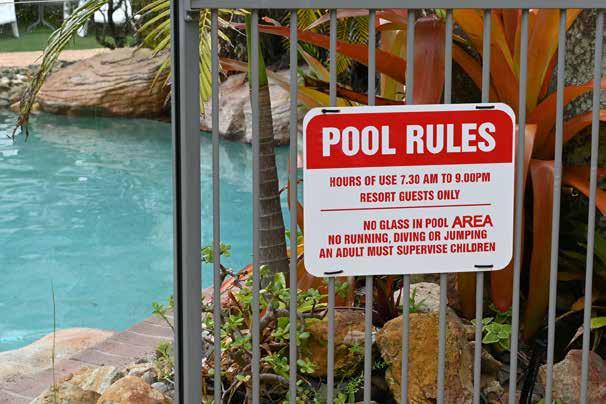
4 minute read
SUMMER HEALTH TIPS
1. Stay hydrated: Drink plenty of water throughout the day to prevent dehydration. Aim for at least 8 glasses of water per day, and more if you're spending time outdoors or engaging in physical activities.

Advertisement
2. Protect yourself from the sun: Apply sunscreen with a high SPF (at least 30) before going outside, even on cloudy days. Wear protective clothing, such as a wide-brimmed hat and sunglasses, and seek shade during the peak hours of sunlight (usually between 10 a.m. and 4 p.m.).

3. Stay cool: Avoid overheating by staying in air-conditioned spaces when possible. If you don't have air conditioning, use fans, take cool showers, or visit public places like libraries or shopping malls to keep cool.






4. Eat fresh and light: Take advantage of the abun dance of fresh fruits and vegetables available during the summer. They are packed with nutri ents and can help keep you hydrated. Opt for lighter meals and include more salads, smooth ies, and grilled foods in your diet.

5. Exercise wisely: Engage in physical activities during the cooler parts of the day, such as early morning or late evening, to avoid the heat. Stay hydrated during exercise and listen to your body. If you feel lightheaded or dizzy, take a break and rest.

6. Prevent foodborne illnesses: With warmer temperatures, the risk of food spoilage and contamination increases. Wash your hands thoroughly before handling food, and keep perishable foods refrigerated or in a cooler when outdoors. Avoid leaving food out for extended periods and discard any leftovers that have been sitting out for too long.
7. Stay mindful of insects: Protect yourself from insect bites by wearing insect repel lent when outdoors, especially in wooded or grassy areas. Check for ticks after spend ing time in nature. If you're prone to allergies from bee or wasp stings, keep appropriate medications or an EpiPen handy.







8. Practice water safety: If you're swimming or participating in water activities, follow safety guidelines and swim in designated areas. Keep an eye on children at all times and ensure they wear appropriate flotation devices if needed.


9. Take care of your eyes: Wear sunglasses that provide UV protection to shield your eyes from harmful sun rays. If you wear contact lenses, remember to clean and store them properly to avoid eye infec tions.

10. Prioritize rest and relaxation: Summer can be a busy season, but it's essential to take time for yourself and relax. Get enough sleep each night to support your overall well-being.
Remember, these tips are general guidelines, and it's always a good idea to consult with a healthcare professional for personalized advice based on your specific health needs. Enjoy your summer and stay healthy and safe!

IS YOUR RELATIONSHIP ON THE ROCKS?
Recognizing when a relationship has broken down can be a subjective process, as each relationship is unique. However, there are some common signs that may indicate a relationship is in trouble. Here are some indicators to consider:

1. Communication breakdown. If communication becomes consistently negative, hostile, or ineffective, it can be a sign that the relationship is deteriorating. Difficulty expressing thoughts, feelings, and needs, or a lack of active listening and understanding, can strain the connec tion between partners.
2. Frequent conflicts and unresolved issues. Constant arguing, recurring conflicts, or a pattern of unresolved issues can indicate a breakdown in the relationship. If conflicts are escalating, becoming more frequent, or if attempts at resolution are unsuccessful, it may suggest deeper underlying problems.
3. Loss of emotional connection. When the emotional bond between partners weakens or disappears, it can be a sign that the relationship is breaking down. Feelings of detachment, disinterest, or a lack of intimacy and affection can be indications of this.
4. Decreased quality time and shared interests. If there is a significant decrease in the amount of quality time spent together or a loss of shared interests and activities, it can indicate a growing distance between partners. A lack of connection and investment in each other's lives can contribute to relationship breakdown.
5. Lack of trust and betrayal. Trust is vital in a healthy relationship. If trust has been broken through betrayal, dishonesty, or a pattern of unfaithfulness, it can be difficult to rebuild the foundation of the relationship. Trust issues can significantly erode the bond between partners.
6. Emotional or physical abuse. Any form of emotional or physical abuse is a clear indication that the relationship has broken down. If you or your partner are experienc ing abuse, it's crucial to seek help and prioritize your safety and wellbeing.
It's important to remember that relationship difficulties can sometimes be resolved through open communication, therapy, or other interventions.
It's important to take certain steps to navigate through the process. Here are some suggestions on what you can do:
1. Give yourself time and space. Allow yourself to process the emotions and give yourself some distance from the situation. This can help you gain perspective and clarity about the relationship.
2. Communicate openly and honestly. If possible, have a calm and respectful conversation with your partner about the state of the relationship. Share your thoughts and feelings honestly and listen to their perspective as well.
3. Seek professional help if needed. Consider couples therapy or relationship counseling if you believe there is a chance to work things out. A trained professional can facilitate productive discussions and provide guidance to help you navigate the challenges.
4. Take care of yourself. Focus on self-care during this difficult time. Engage in activities that bring you happiness, prioritize your physical and emotional well-being, and surround yourself with supportive friends and family. Take the time to heal and nurture yourself.
5. Reflect on the relationship. Use this opportunity to reflect on the dynamics of the relationship, both the positive aspects and the challenges. Identify patterns, lessons learned, and areas where personal growth is needed. This self-reflection can contribute to personal development and healthier future relationships.

6. Seek support from loved ones. Reach out to your support network of friends and family. Share your feelings and concerns with them, as their perspectives and experiences can offer valuable insights and comfort during this time.
If you consistently notice several of these signs and have made efforts to address the issues without improvement, it may be an indication that the relationship has broken down irreparably.

Ultimately, trust your instincts and evaluate your overall happiness, fulfillment, and emotional well-being within the relationship.
Seeking the guidance of a qualified therapist or counselor can also provide valuable insight and support during this challenging time.
Acceptance and moving forward
Accept that the relationship has ended and allow yourself to move forward. It's normal to feel a range of emotions, including sadness, anger, and confusion. However, by focusing on personal growth and building a fulfilling life outside of the relationship, you can gradually move on and open yourself up to new possibilities.










